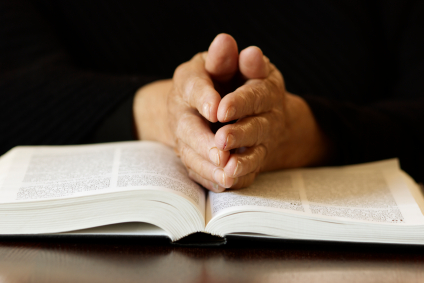Life Decisions: Articles of Faith?
PhD students find religion plays role in choosing where to live and work
 Photo/iStockphoto
Photo/iStockphotoReligion has influenced many of Emily Sigalow’s major life decisions.
Sigalow, a PhD candidate in the joint sociology and Near Eastern and Judaic studies program, says Judaism affected important decisions such as the decision to study and work in Israel.
But how does faith impact decision-making in other religions, especially Christianity, less preoccupied with law than Judaism or Islam? Does it affect decisions about jobs, career paths or where to live?
Sigalow, with fellow PhD candidates Michelle Shain, of the Cohen Center for Modern Jewish Studies and the Heller School; and Meredith Bergey, of the sociology department and the Heller School, found that faith does indeed influence some traditionally secular decisions among Christians and other faith-based communities.
The trio also found that among Christians, religious identity is much more influential than the prescriptions of a particular denomination. Catholics, for example, are just as likely to be influenced by religious tenets in choosing where to live or work, as are equally devout black or evangelical Protestants.
“Religion and Decisions About Marriage, Residence, Occupation, and Children,” was published recently in the Journal of the Scientific Study of Religion, and has been garnering media attention since, including a story on The Huffington Post. The article, the first published paper for all three women, sparked interest because it explored often overlooked questions, Sigalow says.
“Most people are interested in religious participation,” she says. “We were interested in how religion happens outside churches and synagogues. How does it actually motivate people?”
The Brandeis researchers mined data from the 2006 Portraits of American Life Study, examining the responses of participants who reported that religion played a somewhat to very important role in their lives.
They focused on four questions: How do religious principles influence career choice, marriage, place of residence, and number of offspring. The study included respondents who identified themselves as Catholic, mainline Protestants, evangelical Protestants, black Protestants, other Protestants, unaffiliated and others, including religious minorities such as Jews, Hindus and Buddhists.
In addition to finding that religion influences traditionally secular decisions about career and where to live, Sigalow, Shain and Bergey found that the often faith-based decision of having children is becoming more secular.
Only 31 percent of very religious and 13 percent of somewhat religious respondents cited faith as a factor in having children. Comparatively, 56 percent of very religious and 27 percent of somewhat religious respondents said faith influenced their career decisions.
“During the baby boom, there was a very clear relationship between religion and the number of children a family chose to have,” Shain says. “But, beginning with Generation X, that’s really started to change.”
More research is needed to truly understand why, Shain says.
“I think this paper is drawing attention to the fact that religion acts in complicated way and affects a lot of life decisions,” Sigalow said. “The fact is, most people don’t separate their religious life and secular life. People don’t have a separation of church and state.”
Read “Religion and Decisions About Marriage, Residence, Occupation, and Children”
Categories: Humanities and Social Sciences, Research





